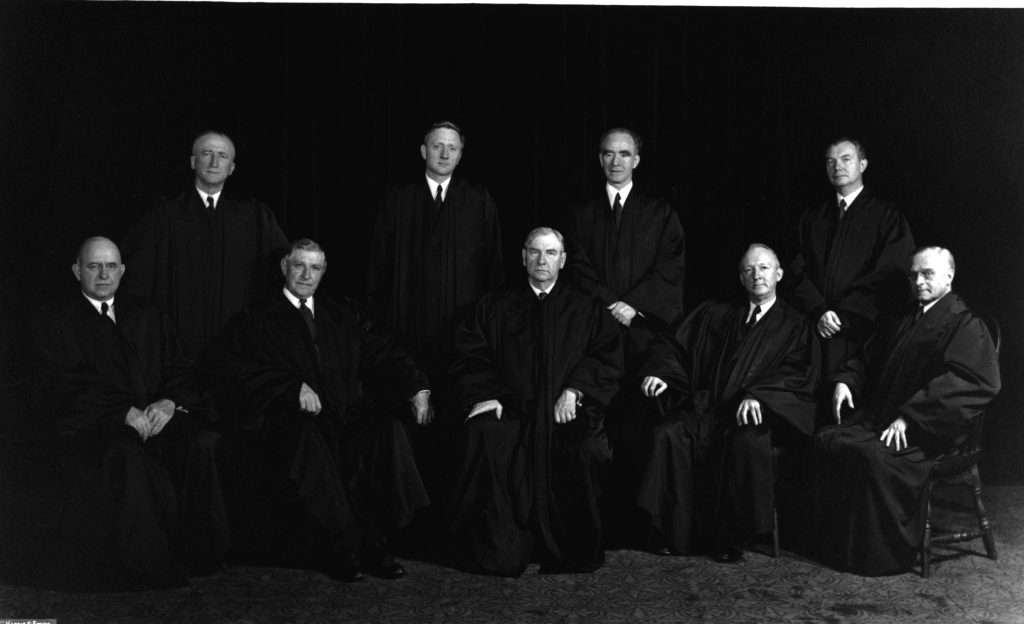The Volokh Conspiracy
Mostly law professors | Sometimes contrarian | Often libertarian | Always independent
Today in Supreme Court History: November 9, 1942
11/9/1942: Wickard v. Filburn decided.

Editor's Note: We invite comments and request that they be civil and on-topic. We do not moderate or assume any responsibility for comments, which are owned by the readers who post them. Comments do not represent the views of Reason.com or Reason Foundation. We reserve the right to delete any comment for any reason at any time. Comments may only be edited within 5 minutes of posting. Report abuses.
Please to post comments


Another day that will live in infamy.
Pretty clearly a correct decision.
I mean, you can object to the whole price stabilization scheme as bad policy, but once you adopt it Wickard v. Filburn follows.
I don't think it really does.
People make fun of the Roberts court's searches for "limiting principles", but you really do need one here, or you end up with "growing a marijuana plant on your windowsill is part of interstate commerce". And that's not some phony hypothetical- the Court actually decided it was later, and it was outrageous.
Basically, Filburn should have won IF he could have proven that he was just doing subsistence farming. If that means the federal government can't regulate true subsistence farmers, they can surely find a way to regulate the agricultural market without doing that.
OTOH, there are arguments that Filburn wasn't really a subsistence farmer. If he was actually participating in the market for grain, he should have lost on the merits.
Is there a government-created cartel supporting marijuana prices?
It doesn't matter. The point is, whatever the government wants to do, what you do in your own house for your own consumption is not within the Commerce Clause.
Why doesn't it matter? The whole point is that there was a regulatory scheme in place and Filburn violated it. Wasn't that what the case was all about?
Suppose he had sold the over-quota wheat, at the artificially high cartel price. Would that be OK? If not, then how can using it himself be? In either case he gets the benefits of the cartel, while breaking the quota. Enough of that and the cartel collapses.
That's not what the case was about, if Congress lacked the constitutional authority to reach the conduct in question with their regulatory scheme.
"Enough of that and the cartel collapses."
Like that's a bad thing. FDR's ventures into central planning prolonged the Great depression.
If he sold the over-quota wheat, the government can regulate that!
My position is very simple- the federal government has no power to regulate what you grow on your own property for your own use. But the moment you enter an interstate market, you are fair game.
Filburn claimed to be a subsistence farmer. FDR should have had no power to tell an actual subsistence farmer (say, an Indian tribe member who grows fruits and vegetables on a small plot for his own family) what to do, because that is not interstate commerce.
But if the DOJ could prove he was selling wheat on the interstate market, he should lose.
Yay statism?
The end of the old federal republic, replaced by a nearly all powerful central government.
Laughable hyperbole.
I know this case approved the FDR accelerations and encouraged more, but didn't it really begin back in the 1870s by regulating railroads? The railroads (bootleggers) wanted to stop competition among themselves, the shippers (Baptists) wanted to keep rates low, and the politicians wanted to appear as active as their Civil War brethren to get votes.
Sure, there had been expansions of the federal government before but this fully unleashed the feds to control all US economic activity.
It's been all downhill since 1942.
I wouldn't be surprised if SCOTUS took a case to decide whether to overrule Wickard v. Filburn.
Before enlargement of the Court, or after?
Raich was that case, and the conservatives (who themselves love all sorts of laws that regulate the entire country) wouldn't pull the trigger.
Um, by "the conservatives," you mean Scalia.
Eh, that case was about people that wanted to get high and call it medicine. I sure Scalia felt that he didn't need to worry about being intellectually consistent if it would favor drug users. Just like when people want to get high and call it religion. Can't condone such immoral behavior, amirite?
He did come right out and admit to not being a consistent originalist. Kinda pathetic admitting you know what the principled thing to do is, and not doing it anyway.
And to preserve federal drug laws, of all things. Like it would be a cosmic disaster if drug regulation were limited to the states.